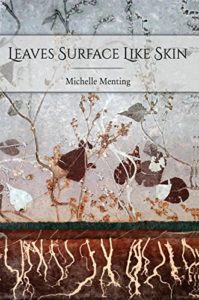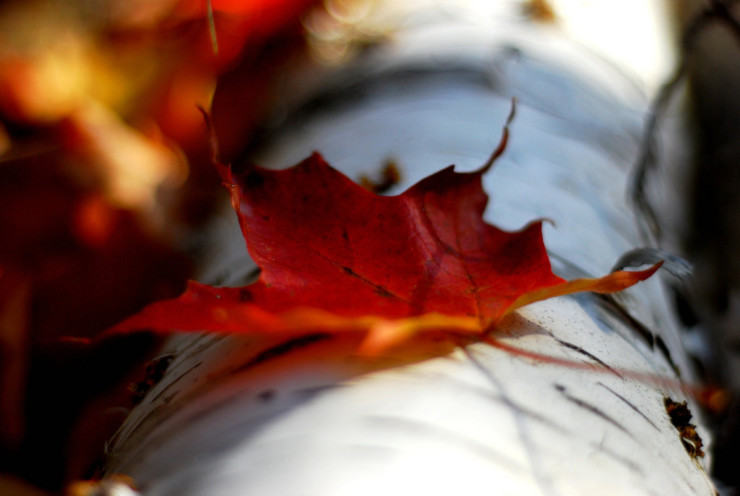Lichen sticking to the grooves of tree bark. Pine needles surrounding a house embedded in the woods. A pale, yellow flower grazing the finger of a young man leaving for war. Imagining life as a tardigrade, or “little water bear.” Bramble-scrawled oak trees. Burial mounds so natural they seem part of the landscape.
Nature and geography offer a wealth of images and metaphors for poetry, and poet Michelle Menting drinks deeply from that source in her new collection, Leaves Surface Like Skin. The 46 poems of the collection are filled with nature’s images, but filled in a distinct way. Menting uses nature, geography, landscape, and the seasons to probe and push against the human condition. This is not so much nature poetry as it is nature poetry in the service of understanding yourself and the people surrounding you.
Consider the sharing of a simple photograph. A brother and sister are framed by rocks and mountains. The photograph is being shared because the sister wants her friend to see the brother who has left for war. The poem is filled with images of landscape—rocks, boulders, mountains, foothills, prairie, sky. But one particular image leaves an indelible impression, an indelible memory.

I haven’t met him, not yet, not soon,
but you showed me that picture,
the two of you in the mountains, the rocks
in the background all cragged like a snapshot
of a shudder as if chills could be caught
on the face of stones. If only you with your gaze,
that half-sober smile—drunk from nostalgia
and bonding over beers—could buffer that landscape,
could blanket those sharp edges, place everything
in soft focus. But the focal point, the real one
if I could pick it, was that pale yellow flower,
the one your brother grazed with his left index finger.
Its stem, bent and leaning, bowed across the space
between the two of you. In the background,
just a glimpse of sky. And all those rocks and boulders
stuck in that photograph, with you with your brother,
will remain in that western land, will be there in autumn
when we drive out to watch the prairie grass copper,
when we look out across the crevices of rock,
when we climb the foothills and wait.
What lingers is that image of the pale, yellow flower, the fragile piece of beauty in a landscape of jagged lines and edges. You can see the brother’s left index finger touching that flower; you can understand how much the brother is like that flower, a fragile piece of life in a harsh world.

Michelle Meeting
This is typical for the poems in Menting’s collection.
Menting has published two poetry chapbooks, Myth of Solitude (2013) and Residence Time (2016). Her poetry has been published in numerous literary journals; she has served and serves as editor for a number of poetry and literary publications; and she is becoming poet-in-residence at the National Park Service’s Isle Royale National Park. She received a B.A. degree from the University of Wisconsin-Madison, M.F.A. and M.A. degrees from Northern Michigan University, and a Ph.D. degree from the University of Nebraska.
Leaves Surface Like Skin is a fine, striking example of how poets can use the imagery of nature to move far beyond the image and strike the mind, and the heart.
Photo by Ankakay, Creative Commons, via Flickr. Post by Glynn Young, author of the novels Dancing Priest and A Light Shining, and Poetry at Work.
__________________________

“I require all our incoming poetry students—in the MFA I direct—to buy and read this book.”
—Jeanetta Calhoun Mish
- Longfellow’s “Paul Revere’s Ride”: Creating a National Legend - April 17, 2025
- Poets and Poems: Katie Kalisz and “Flu Season” - April 15, 2025
- Poets and Poems: Michelle Ortega and “When You Ask Me, Why Paris?” - April 10, 2025

Sandra Heska King says
Poet in residence at Isle Royale? My husband and I have always wanted to go there and had finally made reservations at Rock Harbor last year that we had to cancel because of the move. And… kind of funny… my sophomore granddaughter told her mom she wants to go visit NMU because she heard they accepted lower grade points. That’s the spirit.
So anyway… now I feel bonded with Meeting. And that she’s a nature girl. Well, then, I need to go find her. Or at least her book.
I lingered over these words on my first read-through, “all cragged like a snapshot
of a shudder as if chills could be caught on the face of stones.”
Laura Brown says
I have a marvelous book of art and writing created by artists in residence at Isle Royale. Got it for a few bucks on a sale table at Barnes & Noble. Snady, I’ll leave it to you in my will.
Maureen says
I just sent a link about that artist in residence program to a painter who’s a friend of mine. He’s a child of nature and would absolutely love painting there.
Would love to see that book, Laura.
Laura Brown says
The Island Within Us: Isle Royale Artists in Residence 1991-1998. It’s out of print, but it looks like there are a few cheap used copies available.
http://amzn.to/2zgzLvd
Sandra Heska King says
Snagged one Christmas gift for D. Thank goodness I don’t have to wait for your will. 🙂
Sandra Heska King says
Sweet!!!!
I hope it’s not too soon, though.
Maureen says
The cover, with those roots untethered to the soil, is a wonderful visual evocation of the poems inside the book.
And what a lovely selection you’ve made from the poems, Glynn. It’s a poem that could spark such discussion. It speaks to the solidness, the lasting-ness, of relationships (all those rocks) but also to the difficulty of holding on to memories, which can transmute, when physical presence is absent. I love the image of the flower, one of the many things in nature that, unlike rocks, remains for so short, too short, a time.
I will have to get this book!
Bethany R. says
Another illuminating post, and beautiful poem. This one made me think about why the brother was drawn to touch the flower. The image leaves a lasting impression.
I like what you pointed out, Maureen, about the “difficulty of holding on to memories, which can transmute, when physical presence is absent.”
Glynn says
For me, touching that flower means touching the fragility of life.
Michele Morin says
Beautiful review. Thanks for the intro to this poet.